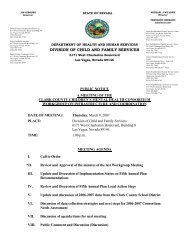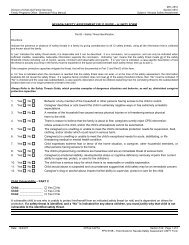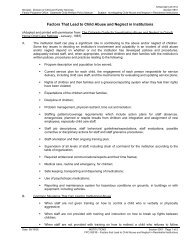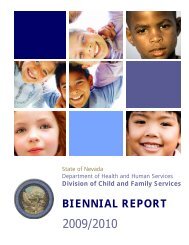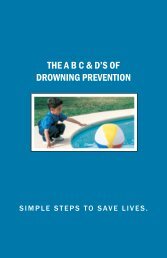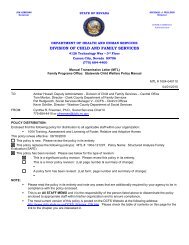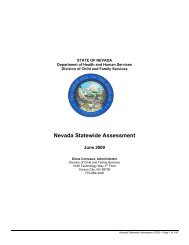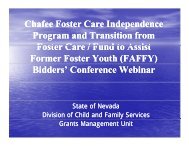STATE OF NEVADA - Division of Child and Family Services
STATE OF NEVADA - Division of Child and Family Services
STATE OF NEVADA - Division of Child and Family Services
Create successful ePaper yourself
Turn your PDF publications into a flip-book with our unique Google optimized e-Paper software.
input has been used <strong>and</strong> how information has been shared with the stakeholders throughout the year between annual<br />
reviews.<br />
In addition to those activities listed in a similar objective in Item 38, DCFS also engages in several stakeholder groups as<br />
outlined in the Decision Making Process narrative in Section 1 <strong>of</strong> this document. These groups include:<br />
1. Decision Making Group made up <strong>of</strong> the DCFS Administrator <strong>and</strong> Rural Region Manager <strong>and</strong> the Directors <strong>of</strong> WCDSS<br />
<strong>and</strong> CCDFS. This group meets on the third Friday <strong>of</strong> each month.<br />
2. Training Management Team made up <strong>of</strong> the DCFS Social <strong>Services</strong> Chief III (Training Manager); Training managers<br />
from each child welfare agency, a member from Differential Response <strong>and</strong> the Training Coordinators from each <strong>of</strong> the<br />
State’s two University Departments <strong>of</strong> Social Work. This group meets on the second Monday <strong>of</strong> each month with<br />
additional subcommittee workgroups meeting as <strong>of</strong>ten as weekly. Recommendations from this group that require<br />
DMG approval are submitted to the DMG meeting in the month following the meeting where the recommendation is<br />
made.<br />
3. Policy Approval Review Team made up <strong>of</strong> upper management from DCFS’s <strong>Family</strong> Programs Office, Information<br />
Management Systems, Rural Region <strong>and</strong> Juvenile Justice Offices <strong>and</strong> upper management from CCDFS <strong>and</strong> WCDSS.<br />
Individual workgroups that develop policy include additional stakeholders as required by the subject matter. The<br />
workgroups meet as <strong>of</strong>ten as required to complete the necessary policy development or revision. PART meets on the<br />
first Wednesday <strong>of</strong> each month to review policy. When a policy is recommended for approval by DMG, it is placed on<br />
the DMG agenda in the month following the PART meeting where the recommendation was made to ensure that the<br />
policy is polished before it reaches the final approval process.<br />
4. Statewide Quality Improvement Committee made up <strong>of</strong> managers <strong>and</strong> specialists from DCFS’s <strong>Family</strong> Programs<br />
Office, Information Management Systems, Rural Region <strong>and</strong> managers from CCDFS <strong>and</strong> WCDSS. This team also<br />
brings in external stakeholders when appropriate to review quality improvement activities. This committee has two<br />
subcommittees that are working on the revisions to the Quality Improvement Framework <strong>and</strong> Quantitative <strong>and</strong><br />
Qualitative Data reports.<br />
These teams use a variety <strong>of</strong> methods to ensure that statewide policies, training <strong>and</strong> quality improvement activities related<br />
to Safety, Permanency, Well-Being, <strong>and</strong> Systemic Performance Indicators are reviewed <strong>and</strong> up-to-date. In the 2009<br />
Nevada CFSR report, this item was rates as a strength. This continues to be a strength for Nevada.<br />
Item 40: Coordination <strong>of</strong> CFSP services with other federal programs<br />
Goal: The State will ensure that the services identified under the CFSP are coordinated with the services or benefits <strong>of</strong><br />
other Federal or federally assisted programs serving the same populations.<br />
To meet this goal, the State must provide ongoing opportunities for stakeholders to provide input <strong>and</strong> report on the<br />
activities engaged in by a variety <strong>of</strong> stakeholder groups to ensure that the appropriate stakeholders <strong>and</strong> other key federal<br />
programs are involved in the development <strong>of</strong> regulation, policy, training <strong>and</strong> proposed changes in practice. To do this, the<br />
State must coordinate with key Federal programs. The following is a list <strong>of</strong> advisory boards/committees/workgroups <strong>and</strong><br />
or projects the <strong>Division</strong> utilizes when gathering information needed for the CFSP/ASPR:<br />
• Administrative Team to Review the Death <strong>of</strong> <strong>Child</strong>ren<br />
• CIP - Court Improvement Project<br />
• CJA - <strong>Child</strong>ren's Justice Act Task Force<br />
• Clark County Department <strong>of</strong> <strong>Family</strong> <strong>Services</strong><br />
• Clark County Foster <strong>and</strong> Adoptive Parent Association<br />
• CRP - Citizens Review Panels<br />
• Executive Committee to Review the Death <strong>of</strong> <strong>Child</strong>ren<br />
• ICWA Steering Committee<br />
• Inter-Tribal Council <strong>of</strong> Nevada<br />
• Nevada <strong>Division</strong> <strong>of</strong> <strong>Child</strong> <strong>and</strong> <strong>Family</strong> <strong>Services</strong> – Rural Region<br />
• Nevada Partnership for Training<br />
Nevada APSR – SFY 2010<br />
Page 70 <strong>of</strong> 108



